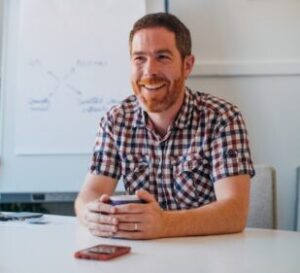Maybe Covid was going to change, or even end homelessness for good?
Arch GP and Executive Director, Tim Worthley reflects on how the uniqueness of the pandemic and society’s response to end street homelessness gives him hope for the future.
 When I think now about the start of the pandemic it all feels a bit like a dream. It can be easy to forget what an uncertain and frightening time it was.
When I think now about the start of the pandemic it all feels a bit like a dream. It can be easy to forget what an uncertain and frightening time it was.
In the blink of an eye we couldn’t travel, see friends, or hug loved ones. We couldn’t say proper goodbyes to people, and were filled with anxiety for our own health as well as for friends and family.
In that context, work was a bit of a lifeline. It gave us a reason to escape our homes, to meet with people, and provided something practical to focus on in the midst of so much uncertainty. Not that work wasn’t confusing! Should we wear face masks? If so where to get them from? How should we ration PPE? How many people allowed in a room together? Which patients could come to see us, and which couldn’t? Which air purifiers should we buy, and could I open our windows any wider?!
We made a lot up as we went along. It was exhausting, but also exhilarating. We were being asked what was needed for our patients, and when we came up with solutions they were swiftly put into action. Within weeks we had distributed basic mobile phones to all our patients who needed them, had helped to set up four ‘homeless’ hotels, had designed protocols to keep everyone experiencing homelessness in Brighton safe, and were providing 7-days a week medical cover to these sites. And then within a year we were providing the first round of vaccines around the city to people who would never have otherwise received them. I don’t think I’ve ever been more proud of our small team than I was in that year. Every member of the team was exceptional. We looked after each other, and were part of a crucial, life-saving effort.
It had become a moral imperative that no one should be allowed to sleep rough
The pandemic revealed a hidden truth – that street homelessness can be eradicated. And it can happen almost overnight. In the early days of lockdown we often wondered if or when life would go back to ‘normal’. But as the days and weeks went by we began to hope that at least in some ways, it wouldn’t. Maybe society would find an altogether better way of being? In March 2020, it had become a moral imperative that no one should be allowed to sleep rough, that everyone should be offered their own room – somewhere safe, and three meals a day should be provided to people who couldn’t afford to eat. And what we learnt from this is that when people are given these basic human dignities, along with care and attention, they start to recover from trauma and addiction.
Sadly, bit by bit, we have ended up back where we were at the start of 2020, and these injustices have again become commonplace. However, perhaps we can be grateful that we lived through a time when our society recognised the horror of homelessness for what it is and decided to end it. We have proof that it can be done. And so we live and work in the knowledge that this is not beyond us, and that the fight for a fairer society is not only good but also hopeful.